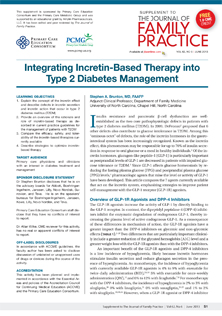User login
The glucagon-like peptide-1 receptor (GLP-1R) agonists and dipeptidyl peptidase-4 (DPP-4) inhibitors have quickly become important treatment options for persons with type 2 diabetes. This article reviews the differences among the 3 GLP-1R agonists and 4 DPP-4 inhibitors currently available and how these differences impact treatment individualization. Emphasis is placed on strategies to improve patient self-management with the GLP-1R agonists, particularly those related to nausea and vomiting and medication adherence.
Physicians and Physician Assistants – Click Here to Take the Test
The glucagon-like peptide-1 receptor (GLP-1R) agonists and dipeptidyl peptidase-4 (DPP-4) inhibitors have quickly become important treatment options for persons with type 2 diabetes. This article reviews the differences among the 3 GLP-1R agonists and 4 DPP-4 inhibitors currently available and how these differences impact treatment individualization. Emphasis is placed on strategies to improve patient self-management with the GLP-1R agonists, particularly those related to nausea and vomiting and medication adherence.
Physicians and Physician Assistants – Click Here to Take the Test
The glucagon-like peptide-1 receptor (GLP-1R) agonists and dipeptidyl peptidase-4 (DPP-4) inhibitors have quickly become important treatment options for persons with type 2 diabetes. This article reviews the differences among the 3 GLP-1R agonists and 4 DPP-4 inhibitors currently available and how these differences impact treatment individualization. Emphasis is placed on strategies to improve patient self-management with the GLP-1R agonists, particularly those related to nausea and vomiting and medication adherence.
Physicians and Physician Assistants – Click Here to Take the Test
